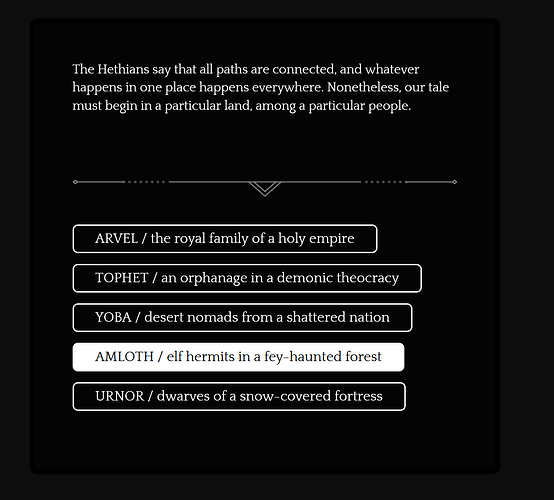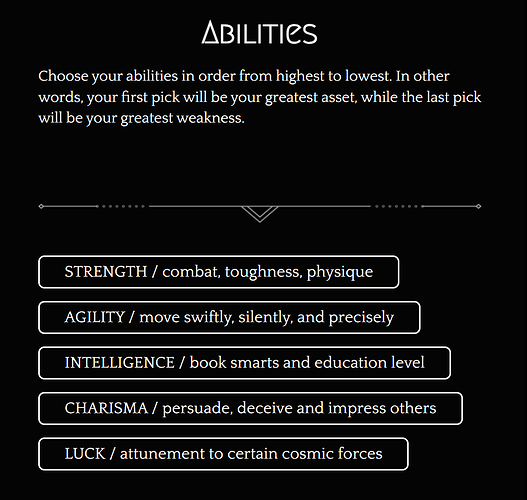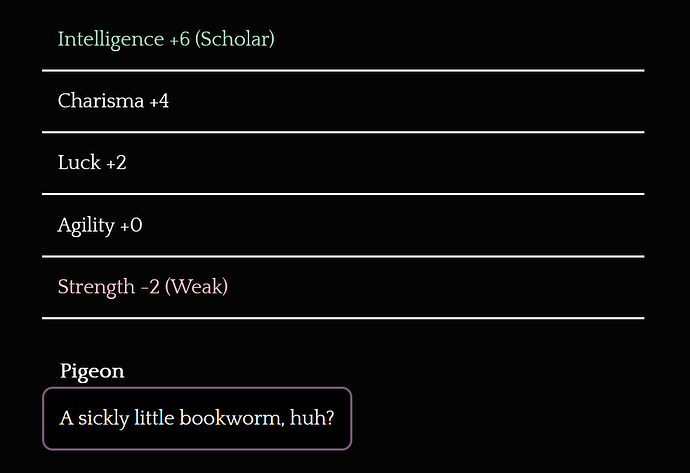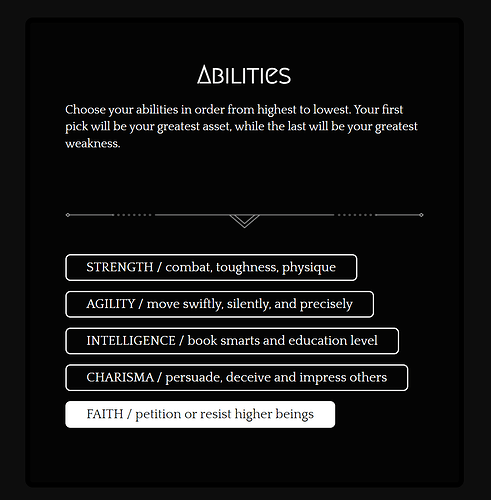Question. Are you obsessed with creating characters in RPGs? For me, it’s one of the major draws of the genre. Which is why I’ve been experimenting with different ways to go about it in Veiled Age. I think there are many valid ways to approach character creation, so it comes down to what way best suits my design goals.
If you asked me whether I generally preferred an RPG to have classes or a classless system, I’d say I prefer classes. They’re more thematic. Classes paint a picture. A fighter, a cleric and a thief walk into a bar.
However, they’re not ideal for every game. Much of what usually defines these classes is the list of special abilities it uses in battle. And while monsters will definitely be killed in Veiled Age, this isn’t a game with a battle system at all. Classes are a mechanics-oriented concept. As a writer, I think asking the player to choose a “class” at the beginning might be overselling what I’m really trying to do with a mechanics-light game.
Classes can make NPCs redundant
More importantly, there’s something about player-chosen classes that bugs me in party-based RPGs: redundancy. For example, say you meet a thief who can pick locks. They want to join your party. Welp, that’s too bad, because you already chose the Thief class for yourself, so you don’t need them. The fiction says the character is very special, but the game says they have the same skills as you. Maybe you decide to drag them along anyway to get that juicy subplot or to listen to their quips in the elevator. But it still feels off in terms of game design.
For Veiled Age, I think that thematic element we enjoy from classes could be approached differently: by having these archetypes expressed fully by specific NPC companions, while the player character brings something else to the table entirely.
To go back to our thief example, imagine this. You come across a locked door. The thief NPC offers to pick it. Without them, for example if they’re incapacitated or uncooperative or lying in a ditch somewhere, you have no hope of picking it. There aren’t other thief characters. “Rogue” or “Lockpicking” were not words that appeared in character creation at all. In game design jargon, we could say our thief NPC has niche protection. They can impact the scenario in a way nobody else can, which gives them tangible relevance to the story.
But what about the player character? What defines them? A couple of things, but let’s touch on one.
Origins
Moving away from PC classes is part of a bigger attempt to make the player character’s backstory and subplots more coherent and clear. That means you choose one of five origins, and these will carry more weight than before:
Choosing option 1 here means you’re from the most prosperous empire AND you grew up rich AND you know a lot about the main religion AND you have a connection to a royal family member, AND a particular person wants you dead… you get the idea. In choosing your origin, you’re not just choosing a homeland; you’re choosing your whole backstory as one of five carefully crafted ice cream flavors.
Player Character Stats
Q: All this narrative drama is cool and all, but will player characters still have stats? I like numbers.
A: There will actually be more stats than in the previous version. Stats will be chosen in a very simple way which I’m surprised I’ve never actually seen a game do: you just rank the stats in order of how important they are to you.
Dice modifiers are assigned accordingly. On top of that, while you don’t exactly have a class, your highest and lowest stat may occasionally have special consequences. For example, you only know a third language if intelligence is your highest stat. You only trip down the stairs during a social event if Agility is your lowest stat. Etc.
If you’ve read this far, let me go ahead and zero in on a couple of stats.
Charisma
In various versions of the game, I’ve waffled about whether this should be a stat. Negotiating with people and winning their trust is an important aspect of the game. In the version that’s currently live, I decided against a Charisma stat because I wanted you to have to think about which dialog option is more likely to persuade someone.
However, my issue with not having a Charisma stat is more basic: rolling to try and persuade someone is fun. Anyone who has played D&D will know what I mean. And as this is a fairly cerebral and character-driven storyline with tons of dialog, I think it’s good to include people skills as a stat. Just don’t expect it to be crucial to every conversation.
I think we can have it both ways: rolling to persuade people on occasion can be fun. But NPCs still have a will of their own; they won’t give you their wallet or fall in love with you just because you rolled high. As with other aspects of the story, most of what happens should be the logical outcome of your choices and NPC motivations. But dice are fun for tension now and again, and as a reminder that things don’t always go according to plan.
Luck
This is a stat I definitely want, but I’m not always sure what to call it. No, it doesn’t mildly boost your other stats or something (boring). It affects things that would be completely outside of the protagonist’s control, like whether or not the broom closet happens to have something useful in it. It may also affect the character’s interactions with some of the weird, cosmic, or spiritual elements of the setting. For that reason, I’m half tempted to take a page from Dark Souls and call it Faith. But basically, it’s the “what the heck does this stat actually do?” stat. I’ll know I’ve made it when someday there’s a Youtube video speculating on what the Luck stat actually does.



